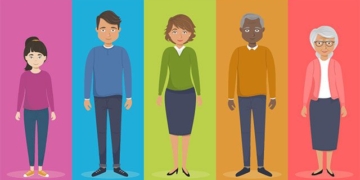When the Intellectual Property Law took effect on July 1, 2006, every book and software you used required a payment for copyright. Are you gaining or losing economically by spending money on “genuine goods”? How can you still use quality products at low prices while respecting the authors?…
When copyright becomes the standard for “pro” work
A friend of mine who works at a media company, during a business trip abroad, updated the copyright control program correctly. The Italian partner immediately halted the meeting and demanded that licensed software be installed before continuing…
 |
|
Book lovers must accept publications with the spirit of “eating the fruit, remembering the one who planted the tree.” |
95% of users in Vietnam use pirated software, which presents us with two challenges: first, the development of domestic software technology and inventions is difficult, and second, it is not recognized internationally.
On June 22 and 26, the Civil Court of Hanoi examined the first instance of journalist Pham Thi Ha suing the Culture and Information Publishing House. As a result, this publishing house will be held accountable for copyright violations when using works to publish books without the author’s permission. This is not an exceptional case in our current publishing activities, but it will be a significant milestone before the Intellectual Property Law takes effect on July 1, 2006.
On this issue, poet Doan Thi Lam Luyen, Deputy Director of the Literary Copyright Center, shared: “Creators are like diligent gardeners. Book lovers must accept publications with the spirit of ‘eating the fruit, remembering the one who planted the tree.’ In advanced countries, the trees by the roadside bear fruit, and no one picks them. When the fruit falls, people don’t even step on it. They believe that you should not pick the fruit without compensating the one who nurtured it.”
In response to Ms. Luyen, Phan Hoai Nam, a student at the National Economics University, affirmed: “Now we have ‘read’ our ability to update through the Firefox browser, listen to digital music, and read ‘The Lexus and the Olive Tree…’. Soon, young people will evaluate others’ style based on the level of respect for copyright, at which point the pro standard will be: ‘Have you used licensed products yet?’
|
Currently, Vietnam has up to 92% of users who have not purchased licenses for products, across various categories: music, books, etc. In the software sector alone, it is about 95%. (According to BSA) |
Thus, it won’t be long before consumers, including students, may have to pay an additional fee at the beginning of the year called copyright fees, which will be used for photocopying books and lessons. Every photocopying service will have to pay a common copyright fee. Reading books in libraries will also incur copyright fees… Every book or software you use will require a certain payment for copyright.
The government will tighten control over intellectual property management to promote negotiations for WTO accession, economic development, and elevate Vietnam’s status. It is very likely that one day someone will suddenly knock on your computer and check whether your software is licensed. You may be choosing to buy a new book “at the lowest price” on Dinh Le Street (Hanoi), only to have your book confiscated as if you were circulating tax evasion goods…
What do young consumers say?
* Le Don Khue, K50 CA student at University of Technology:
I personally use a licensed Windows version and feel great when I can update freely. But that’s on a laptop that comes with it; otherwise, I would probably buy a pirated disc. Even my friends abroad use unlicensed software openly. Authorities only check periodically.
We need a banking system and developed accounts so that software transactions become clear and controllable. However, the infrastructure in Vietnam has not developed sufficiently.
* Tran Trung Kien, University of Cergy Pontoise – France:
In France, a Windows XP disc costs 300 euros. This price is extremely high compared to Vietnam and cannot be applied here. A more important issue is the awareness of the people; they see it as a natural issue, a habit.
Comparing it to a 10,000 VND disc that has a bunch of software, even if the copyright price is reduced to a minimum, no one will buy it. Here, my classmates who have money buy software to use; if they don’t have money, they go to school to use computers that come pre-installed – it’s as simple as that.
* Nguyen Manh Cuong, Department of Mathematics – Informatics, University of Science:
300 USD is a normal price, while versions for professionals cost about 1000 USD. Even if the price is lowered, it still won’t be as cheap as pirated discs. Moreover, if prices are imposed on different subjects and regions, people will go to buy cheaper ones and have someone else send them the CD-key to install.
This means that our people will find ways to evade the law. Vietnamese companies also won’t rush to buy; they will wait to see whether the penalties will be light or strict, etc… like wearing a helmet. Unless Microsoft offers many enticing services when purchasing a license, the law may not be effectively implemented across all demographics(!).
* Nguyen Van Thach, Hanoi University of Agriculture:
Recently, I heard about a case where a professor at a certain university was sued for using translated materials from another person to create his curriculum and putting his name prominently next to the words “compiled.” If a professor can do that, then many textbooks for students might seriously violate the law because I see teachers often quoting many different books and newspapers indiscriminately.
* Hoang Chung – Philosophy student:
Students are accustomed to rushing out of school to photocopy materials without concern. There are countless books online. There are many bookstores offering free downloads, and how many hacking software files that only cost a few thousand for internet access. Pirated books are sold everywhere with attractive signs like 45-50% off the cover price. The quality of the books is also good, with nice paper, and after being passed around a few times, they are considered as good as new, rarely used. Thus, with limited funds but a thirst for knowledge, students have to accept buying illegal books.
Experts Speak Out
* Mr. Do Huy Hoang, Marketing Director of Microsoft Vietnam: The benefit lies in the way technology is used
A modern desktop is not about having the latest browsers always updated or setting up many programs, but rather in how each individual uses technology.
If you know how to use technology, you will save a lot of money and gain many other benefits. For example: You pay for a technology tool that has supported and trained you. Suppose you pick up the phone to call; you incur costs for the call; storing data on your computer incurs costs for the time spent searching…
Instead of picking up the phone, if you have a chat tool like Yahoo Messenger, the company saves a lot of costs internally. Or if a company wants to open a training class, they need a separate room, hire instructors… Online learning saves all those expenses…
If you want to save high-quality music files, you need to download Windows Media 11. And this software controls copyright. Going forward, new software will automatically control copyright. If you think: I spend money to buy a license, you will only see money leaving your pocket.
How are young people innovating? The answer is selling unripe grain. I know that many young people passionate about innovation have created software like: weather forecasting on mobile phones, playing Chinese chess… And they still create products on programs like Photoshop, AutoCAD… without purchasing licenses, and when it becomes a product, they pass it around for use and copying…
Thus, the mindset regarding copyright is not serious (just doing it for fun). The use of technology is not serious (working on copied software, replicating certain processes). Creating something that you can’t produce will lead to frustration, which is no different than selling unripe grain.
* Ms. Doan Thi Lam Luyen, poet, Deputy Director of the Vietnam Literary Copyright Center: The fault lies not with readers but with the reading organizations.
Those who make and sell books do not pay appropriate attention to the rights of the authors, so how can the reading culture develop? The young generation is not at fault for reading or purchasing pirated books.
What is needed is to establish a new order in managing and enforcing copyright in Vietnam. The most important thing is the monitoring apparatus of these major players. This includes organizations representing copyright protection, closely ensuring the rights of members. It should be like each author having a lawyer, a doctor always concerned, not having to worry about the publishing process, only focusing on creativity and effective integration.
| 5 Affordable Ways to Use Licensed Software |
|
– Purchase a computer and remind the store to install licensed software. Add about 100$ to the setup cost instead of spending about 300$ if you buy and install it yourself. – Form student groups with work needs. For example, a group of 3 architecture students can share the cost of 3 licensed programs, with one specializing in CAD, another in Photoshop… It’s like using bicycles, cars, or planes. Everyone equips themselves with full means but sometimes only needs a bicycle. – Invest according to your needs: If using the latest versions: Windows XP Pro 150$, Lac Viet 20$, Office Pro 200$, free typing tools, totaling 360$/computer. – However, if only using lower versions, clearly list your needs: Internet, email, documents, spreadsheets, music, games, movies… Depending on those needs, the serious cost would only be about 90$ while still being effective. |
M.T- D.N- Chi Le


















































